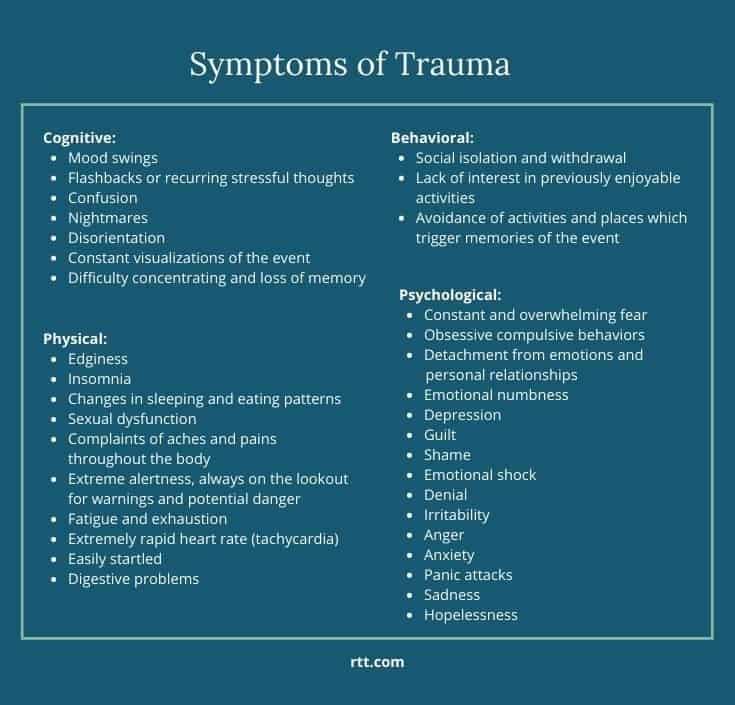Untreated trauma is arguably one of the biggest sources of long-term damage to your life.
An intensely upsetting event shatters your sense of security; you may start to question yourself and view the world as a dangerous place.
Even after it’s over, you may find the event difficult to forget and experience painful flashbacks.
You may be triggered by seemingly normal events which cause you to overreact or lash out irrationally. You may even develop destructive behaviors. Addiction to alcohol and drugs can become a means of coping with your trauma.
If you have been affected by a traumatic experience, it is crucial for you to address it as soon as possible. Healing from trauma is the first step towards removing the obstacles which prevent you from living fully and healthily.
If you feel like you may have suffered from trauma in the past, you are in the right place. This article will help explain how to heal from your trauma. We highlight steps you can take to accelerate the trauma recovery process.
You will learn:
- What is emotional or psychological trauma and what are its types?
- Symptoms of trauma
- Effects and consequences of trauma
- What you can do to heal from trauma
- The three stages of healing from trauma
What is Emotional or Psychological Trauma?

The American Psychological Association defines trauma as, “An emotional response to a terrible event such as an accident, rape, or natural disaster.”
Simply put, trauma is a reaction to an incredibly stressful event that leaves you with upsetting emotions, memories, and anxiety long after the event itself.
Your response to the event defines whether you will get the trauma. So the more distressed you are, the more likely you are to be traumatized.
Before you learn how to heal from your trauma, it’s important to understand the main types of trauma and identify which ones you may have.
Types of trauma
While there are various kinds of trauma, most of them fall into three main categories:
- Acute trauma: trauma that is caused by a single event.
Examples of such events: car crashes, assault, rape, natural disasters, severe illness or injury, the death of a loved one, or watching graphic acts of violence.
Symptoms of acute trauma: extreme anxiety or panic, irritation, confusion, feelings of disconnect from oneself, insomnia, suspiciousness, lack of self-care, and reduced focus.
- Chronic trauma: trauma that is caused by being consistently exposed to traumatic events over a long period of time.
Examples of such events: prolonged abuse, childhood abuse, domestic violence, sexual abuse, or war situations.
Symptoms of chronic trauma: trauma-related flashbacks, rage, and anxiety—which may not fully appear until much later on.
- Complex trauma: trauma that results from multiple, often inter-related traumatic events, causing you to develop dysfunctional coping mechanisms.
Examples of complex trauma: if you suffered an abusive childhood which caused you to develop an eating disorder as an adult, this is a sign that you are suffering from complex trauma.
Symptoms of complex trauma: you may feel trapped, struggle with shame and self-esteem, use drugs or alcohol to cope, or resort to self-harm.
Now that you know the main types of trauma. The next step is to identify what trauma symptoms you are experiencing in your day-to-day life.
Symptoms of Trauma: How To Tell If You May Be Suffering From Trauma

Immediately after a distressing event, it’s completely normal for most people to experience strong physical or emotional reactions. However usually, after a few days or weeks, these feelings begin to subside.
If you are suffering from trauma, however, then these symptoms grow increasingly severe. They may last for years or decades after the event.
This could be due to several factors. For example, the nature and intensity of the experience, a lack of emotional support, your personality type, and life stressors.
Certainly, there is no right or wrong way to respond to a traumatic experience—everyone reacts differently.
However, if you recognize or have experienced any of the symptoms below, you may be suffering from trauma.

| Do you experience this symptom? One of the biggest tell-tale signs that you suffer from trauma is emotionally numbing. One study showed that some individuals suppress their emotions because they believe expressing them can be too dangerous, as it can trigger them to “lose it or go crazy.” Therefore, in this case, hypnotherapy can be effective in helping you address your trauma in a healthy, controlled manner. |
Adult Trauma vs. Childhood Trauma
In adults, trauma is frequently associated with physically violent and life-threatening situations. However, trauma can also be caused by almost any negative event that is overwhelming for the individual.
In fact, you don’t even need to experience the event first-hand; you could also experience trauma simply by observing it from a distance (for example, by watching graphic content online).
In children, however, trauma could be caused by events which are less upsetting, but still damaging for their psyche.
For example, children who watch their parents argue could experience feelings of anxiety and self-blame.
They have been conditioned to think that whenever they do something bad, they receive a punishment. So, in their minds, the inverse must also be true—that when something bad happens, it’s because of them.
Therefore childhood trauma can cause you to internalize feelings of shame and low self-worth. You may begin to subconsciously look for confirmation on this new belief. In this case, it would be the belief that you are the cause of your parents’ conflict, and therefore not worthy of love.
Regardless of when you experience trauma, the root cause and effects are essentially the same. These negative emotions are imprinted in your subconscious, creating dysfunctional patterns of thinking and behavior which limit your life.
Mechanics of Trauma

Every time your mind perceives a stressful event similar to your trauma, what most people call a “trigger”, it sends a stress signal to your body.
Because the pain of your trauma was so intense, your mind and body is reminded of it and reacts as though it is happening again. Consequently, as a protection mechanism, it activates your fight-or-flight response.
Your heart rate increases and your stress hormones go up, So this can result in you feeling feel anxious and panicky. You may also have the tendency to lash out, cry, run away, or fight, and in extreme cases pass out.
That is to say, these coping mechanisms are just some of the ways your mind and body protects itself from perceived danger.
Marisa Peer, a renowned therapist who has over 30 years of experience having worked with thousands of clients; believes that this is a completely normal reaction for the mind.
“The simple truth is that the human mind has one simple job: to keep you alive as long as possible.”—Marisa Peer
Your mind is hardwired to move you away from pain, and towards pleasure.
In other words, in the case of trauma, your mind tries its best to avoid the pain caused by the event at any cost. This may include dysfunctional behaviors and thought patterns. For example, drug abuse, sexual addiction, low self-confidence, and low self-esteem.
To clarify, these behaviors and thought patterns may actually soothe you in the short term. However, they are sure to disrupt your life and create further unhappiness over the long term.
Long-Term Effects of Trauma
Trauma can have devastating long-term effects on your physical and psychological health.
A study on Adverse Childhood Experiences (ACE) looked into the effects of abuse, neglect, and traumatic experiences on individuals under 18. It discovered that those who have suffered from ACEs die on average nearly 20 years earlier than those without ACEs.
Even experiencing trauma as adults can cause prolonged exposure to stress, changing how your brain regulates your hormones. If left untreated, this excess stress can lead to premature aging of the body, increasing your risk of early death.
It is not unusual for an individual with Post Traumatic Stress Disorder (PTSD) to experience learning difficulties, develop dysfunctional habits, and have under or over-regulated emotions.
If the trauma and its symptoms are not addressed, emotional pain, uncontrollable emotions, and suffering can become your everyday companion.
This is why it is crucial to take action and begin to process your trauma.
What You Can Do to Heal From Trauma

Everyone’s journey is unique, and healing from trauma is never easy.
Because trauma can be unique to the individual, what works for others may not work for you in the same way, or on the same timeline.
So make sure that you don’t compare your progress with someone else’s. Instead, focus on finding a method that works best for you, and helps you process your trauma in the healthiest way possible.
Proven strategies to help you process your trauma:
1. Understand that trauma recovery is a process
You may have the idea that trauma recovery is a destination, and that there is a point where you will be completely healed from your trauma.
However, this expectation can make you frustrated when your trauma recovery takes longer than, or is different to, what you had expected.
Treat trauma recovery as an ongoing process, and focus on damage reduction instead.
Healing from trauma could be as simple as lessening your symptoms, developing the ability to handle traumatizing memories and difficult moments, and being able to process mixed feelings of joy and sorrow.
2. Control your re-exposure to triggers
After a traumatic event, you may be constantly replaying it in your mind, or be exposed to other stimuli (such as images in the news or on social media), which triggers your ‘fight-or-flight’ response.
Control your exposure to these triggers. The idea is not to avoid these things forever, but to slowly adjust your exposure to them.
Whenever you have a flashback, pause and use relaxation techniques, such as meditation or deep breathing to calm yourself down.
Add filters or avoid news and social media which could trigger you.
These self-care practices can help reduce the stress and anxiety associated with your traumatic experience.
3. Be active
Trauma doesn’t just affect your mind, it affects your physical body too. Trauma causes a spike in your stress hormones and increases your heart-rate, which can overstress your body and cause health issues down the road.
One way to counteract this is by indulging in calming, physical exercises which are soothing for your mind and body. Things like yoga, dance, running, swimming and rock climbing can help you get into a state of “meditative flow”, which causes physical exertion but doesn’t activate your stress hormones. These exercises can be therapeutic for both your mind and body.
4. Re-establish a sense of security
Trauma robs you of your sense of security, causing you to question yourself and doubt everything you know. To start healing from trauma, it is important to re-establish feelings of being safe and in control.
Although it’s impossible to have absolute safety, it doesn’t mean that you can’t be safe. Identify what increases your sense of security, and then practice it every day. Things like journaling or spending time alone can help you regain confidence and a sense of control.
5. Don’t isolate yourself
Healing from trauma can be more effective if you have a strong support system around you.
Do not be embarrassed or afraid to reach out to your loved ones for help.
People who have suffered from trauma often report feeling like they are burdening others with their problems, however, more often than not, this is far from the truth. You may be surprised to discover how the good friends around you are open and willing to extend help and support.
Reconnect with close friends and family. Talk about it.
By socializing and discussing your feelings, you may improve your resilience to stress, which can, again, aid in healing your trauma and moving forward.
6. Look for support groups and resources

One of the most helpful things you can do for yourself is to do your own research on your trauma and its post-trauma symptoms.
Understanding that what you are feeling is a completely normal reaction to an upsetting event. Being able to normalize your post-trauma experience is the first step towards processing your trauma in a healthy way.
Joining support groups of people who have experienced a similar trauma can also help you heal better.
It can be therapeutic to have the support of a group that understands what you are going through, without having to explain yourself.
7. Don’t numb your emotions
Shutting down mentally and emotionally may help you not feel emotions associated with your trauma, but it also causes you to disconnect from yourself, your own life, and social circles.
Do not be afraid to feel your emotions. Pushing them away may feel like a solution, but it will delay your trauma recovery in the long run.
Whenever you feel your emotions coming up, give yourself time and space to process them.
Sit with your emotions. Let yourself experience what is going on in your body and mind. Recognize what it is that you are experiencing and name these emotions; studies have shown that naming your emotions actually helps you to process them better, which is a huge step towards healing from trauma.
8. Speak to a therapist
Despite your best self-care efforts, there may be times when you will need to speak to a therapist.
A certified therapist can help you break through mental blocks and directly tap into your subconscious to address the root cause of your trauma.
A new revolutionary method called Rapid Transformational Therapy® (RTT®) can help you heal from your trauma by addressing it directly from its roots.
Marisa Peer, a world-renowned therapist, bestselling author, and motivational speaker, developed this revolutionary therapy, which is a unique and quick approach to unravel mental blocks—including trauma rooted deep within your subconscious mind.
Marisa believes that your subconscious mind, often unknowingly to you, is responsible for the habits and thought patterns that you demonstrate daily. To that end, RTT® allows you to take a dive deep into this part of the mind, and change these beliefs, habits, and thoughts from their roots.
This results in rapid transformation, helping you process and heal your trauma in as few as one-to-three sessions.
Rapid Transformational Therapy (RTT®) uses a combination of cognitive behavioral therapy, hypnotherapy, Neuro-Linguistic Programming, psychotherapy, and neuroscience to tap into your subconscious mind and directly address your past fears, trauma, and painful memories to replace them with new and empowering ones.
Marisa has worked with thousands of clients to help them recover from traumatic situations and find purpose in their lives once again.
Once you have arranged an appointment with an experienced therapist, your trauma recovery will typically go through three stages.
The Three Stages of Healing From Trauma

When you embark on the healing journey, you will go through the three key phases of healing from trauma. Here is what to expect from each stage:
1. Safety and stabilization
It may take many weeks or months to feel a sense of safety once again. For some, it may take years, depending on the event or type of trauma they experienced. During this phase of healing, the focus is primarily on discovering how to regulate one’s emotions.
2. Remembrance and mourning
During this phase, the focus lies in processing what happened. It involves putting it into words and attaching emotions to it.
Understandably, you want to go through each stage as fast as possible. However, do not try to rush through this stage.
Make sure to pace yourself, as it is easy to become overwhelmed while discussing the event and the meaning associated with it.
3. Reconnection and integration
From here, healing involves the creation of a new sense of self. It includes forming a new vision of your future and taking steps towards it.
At this stage, the trauma should no longer define your life. You should be able to recognize the impact this trauma has had on you, but at the same time, you are ready to let it go and move forward.
This stage may look different for each individual, depending on the trauma they experienced.
Either way, a professional therapist can help guide your trauma recovery and help you navigate through your emotions healthily and constructively.
Book a call with an RTT® therapist today and start a new life filled with hope, free from the afflictions of your previous trauma.


